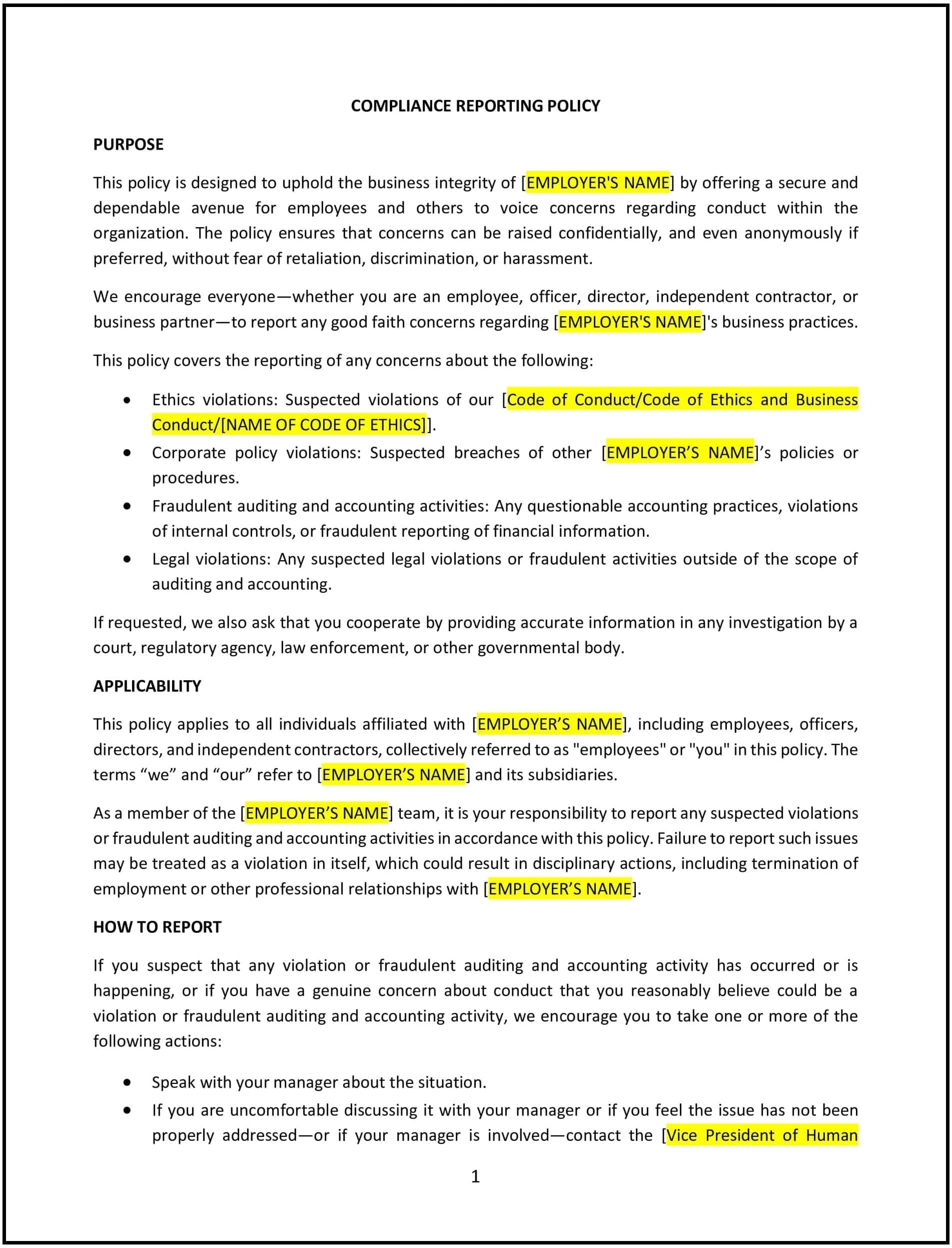Got contracts to review? While you're here for policies, let Cobrief make contract review effortless—start your free review now.

Customize this template for free
Compliance reporting policy (Ohio)
A compliance reporting policy establishes the framework for Ohio businesses to report, address, and resolve compliance issues within the company. This policy provides guidelines for how employees should report suspected violations of laws, regulations, or company policies, including reporting mechanisms, confidentiality protections, and protection from retaliation. The policy also defines the process for investigating and addressing these reports, ensuring that any identified issues are properly resolved and that the business maintains compliance with Ohio state laws and federal regulations.
By implementing this policy, Ohio businesses can create a transparent and accountable workplace where employees are empowered to report compliance issues, ensuring the business operates ethically and in accordance with all legal and regulatory requirements.
How to use this compliance reporting policy (Ohio)
- Define the types of compliance issues to report: The policy should outline the specific types of issues that employees are encouraged to report, such as legal violations, regulatory non-compliance, unethical behavior, safety violations, or breaches of company policy.
- Establish clear reporting procedures: The policy should provide employees with clear instructions on how to report compliance concerns, whether through an anonymous hotline, direct communication with a supervisor, or a dedicated compliance officer. It should specify who is responsible for receiving and managing reports.
- Protect confidentiality: The policy should ensure that all reports are handled confidentially, protecting the identity of the person making the report, unless disclosure is required by law. It should also specify any measures in place to maintain confidentiality throughout the investigation process.
- Prevent retaliation: The policy must emphasize that employees who report compliance issues in good faith will not face retaliation or negative consequences. The policy should outline the business’s commitment to protecting whistleblowers and maintaining a non-retaliatory environment.
- Define the investigation process: The policy should detail how reports will be investigated, including who will conduct the investigation, the timeframe for completing it, and how the business will address findings. It should also specify the actions taken if a violation is found.
- Provide training and awareness: The policy should outline any training or awareness programs for employees to ensure they understand how to identify compliance issues and how to report them effectively.
- Address Ohio state and federal laws: Ensure the policy complies with Ohio state laws and federal regulations related to compliance reporting, whistleblower protections, and reporting procedures.
- Review and update regularly: Periodically review and update the policy to ensure it remains aligned with Ohio state laws, changing business practices, and evolving regulatory requirements.
Benefits of using this compliance reporting policy (Ohio)
This policy provides several key benefits for Ohio businesses:
- Promotes ethical behavior: A clear compliance reporting policy helps foster an ethical workplace culture by encouraging employees to report violations and unethical behavior without fear of retaliation.
- Ensures legal compliance: The policy helps businesses maintain compliance with Ohio state laws, federal regulations, and industry standards by addressing issues promptly and effectively.
- Reduces legal and financial risks: By addressing compliance issues early, businesses can reduce the risk of costly legal penalties, fines, and lawsuits that may arise from non-compliance.
- Improves transparency and accountability: The policy promotes transparency by providing employees with a clear reporting mechanism and holding individuals accountable for their actions.
- Enhances employee trust: Employees who feel that they can report issues without fear of retaliation are more likely to trust the company’s leadership and be committed to the organization’s values and culture.
- Supports a healthy work environment: A non-retaliatory environment that encourages reporting helps to maintain a positive, inclusive, and safe workplace where employees feel comfortable raising concerns.
- Strengthens corporate governance: A robust compliance reporting system enhances overall corporate governance, helping the business align with best practices and regulations, improving its standing with stakeholders, regulators, and investors.
Tips for using this compliance reporting policy (Ohio)
- Communicate the policy clearly: Ensure that all employees are aware of the policy by including it in the employee handbook, discussing it during onboarding, and providing regular reminders.
- Offer multiple reporting channels: Provide employees with multiple ways to report concerns, such as an anonymous hotline, a secure online portal, or direct communication with a compliance officer.
- Ensure a non-retaliatory environment: Reinforce that employees who report compliance issues in good faith will not face retaliation. Clearly communicate the protections available to whistleblowers.
- Protect confidentiality: Take measures to maintain confidentiality and limit the disclosure of the identity of individuals involved in the reporting process.
- Establish clear investigation procedures: Ensure that the process for investigating compliance concerns is clear, thorough, and fair. Provide timelines and steps for resolving issues.
- Monitor the effectiveness of the policy: Regularly assess the effectiveness of the compliance reporting policy by tracking the number of reports, the outcomes of investigations, and employee satisfaction with the process.
- Review the policy regularly: Periodically review and update the policy to ensure it stays compliant with Ohio state laws, federal regulations, and any changes in industry best practices.